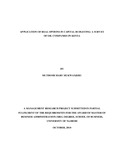Application of Real Options in Capital Budgeting: a Survey of Oil Companies in Kenya
| dc.contributor.author | Muthomi, Mary M | |
| dc.date.accessioned | 2012-11-13T12:37:24Z | |
| dc.date.available | 2012-11-13T12:37:24Z | |
| dc.date.issued | 2010 | |
| dc.identifier.uri | http://erepository.uonbi.ac.ke:8080/handle/123456789/5718 | |
| dc.description.abstract | Many academics and practicing managers recognize that the net present value (NPV) rule and other discounted cash flow (DCF) approaches to capital budgeting are inadequate in that they cannot properly capture management's flexibility to adapt and revise later decisions in response to unexpected market developments. Real options approach to capital budgeting has the potential to conceptualize and quantify the value of options from active management. It is on this background that this study was conducted to determine whether the use of real options had been adopted by Oil companies in Kenya. The oil industry was chosen because it was one of the few that had already adopted the use of real options as per studies conducted in other countries. The study was conducted through the survey method of data collection. It was done through questionnaires administered to the one employee from each oil company. Such an employee would be dealing with capital budgeting. Out of 25 possible responses, only 17 were received giving a response rate of 68%. The findings were that 82.35% of the companies used real options and 17.65% did not. Most of those that used real options did so because real options provided long term competitive advantage through better decision making. The study concluded oil companies do use real options in evaluating capital expenditure and that there was no correlation between the size of company and use of real options | en_US |
| dc.language.iso | en_US | en_US |
| dc.publisher | University of Nairobi, Kenya | en_US |
| dc.title | Application of Real Options in Capital Budgeting: a Survey of Oil Companies in Kenya | en_US |
| dc.title.alternative | Thesis (MBA) | en_US |
| dc.type | Thesis | en_US |

